The Cheung Kong Graduate School of Business (CKGSB) held a forum in New York City on Thursday, September 27, where it brought together business leaders, analysts and academics to discuss current U.S.-China trade frictions and opportunities for the world’s two largest economies to innovate and collaborate across borders. The afternoon was kicked off with a keynote speech by Dr. Xiang Bing, Founding Dean and Professor of China Business and Globalization at CKGSB. Dean Xiang argued that despite recent strong economic growth in the United States, the significance of new U.S.-China trade restrictions “cannot be overstated.” Pointing out that the U.S. and China combine to account for 40% of new global GDP growth, he said that bilateral trade tensions “will have a profound impact on the global economy.”
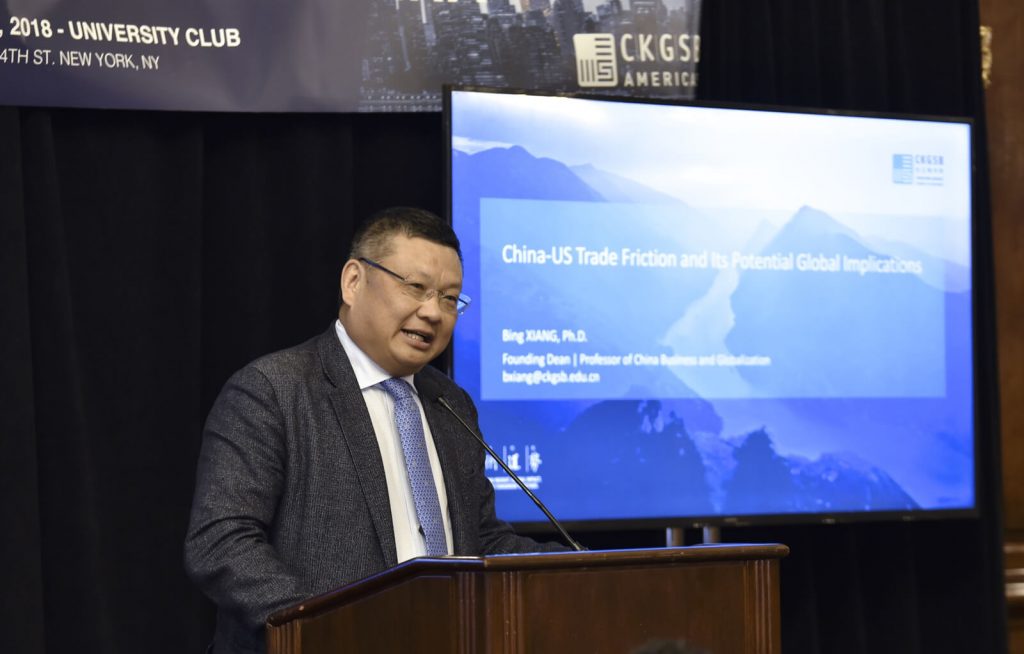
Xiang Bing, Founding Dean and Professor of China Business and Globalization of CKGSB, gives a speech on “US-China Trade Friction and Its Potential Global Implication”
Despite these challenges, however, Dean Xiang posited that there could actually be benefits to new trade frictions. Foremost among these is the new pressure on China to accelerate deregulation and reforms that will help the Chinese economy transition from one based on infrastructure investment, cheap labor, and exports, to one more dependent on the strength of its consumer class and its ability to innovate. In addition, Dean Xiang said, the result of greater barriers to trade between the U.S. and China will also force many Chinese companies “to become truly global.” Because producing and exporting from China is less advantageous than it was in previous years, Dean Xiang argued that Chinese companies will now be forced to produce outside of China. “Chinese companies need to learn to fast how to leverage resources globally to compete globally,” he said.
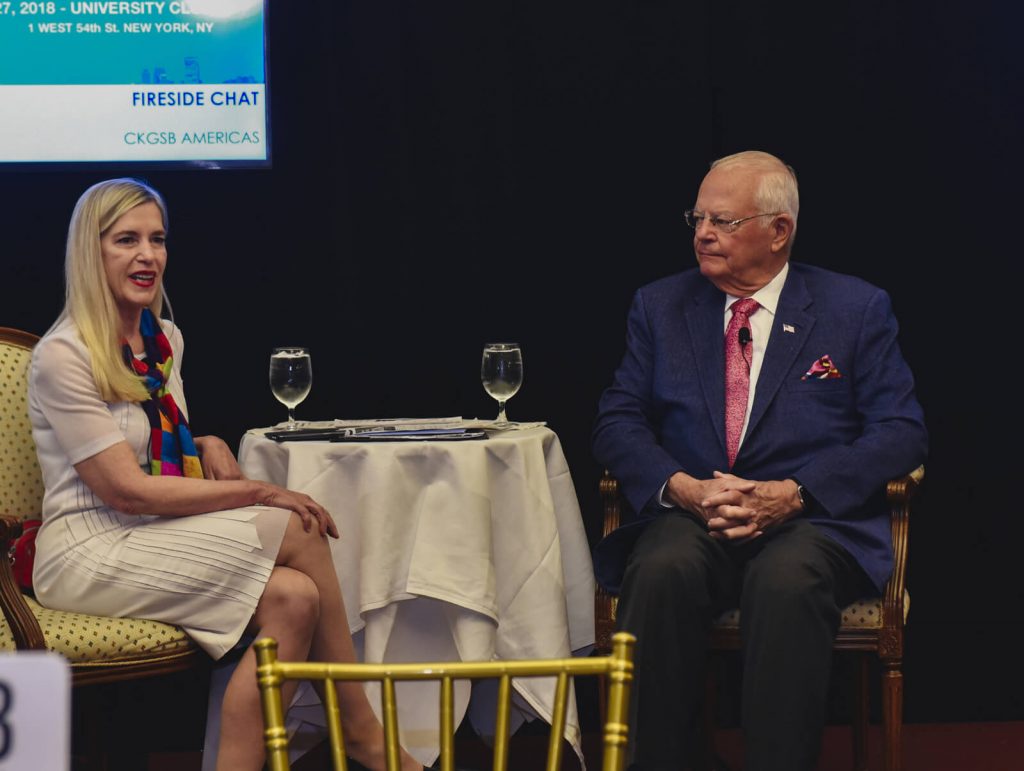
Rebecca Fannin, Founder of Silicon Dragon Venture, and Dixon Doll, Co-founder of DCM Ventures, in the panel: Fireside Chat with VC CEO
Following Dean Xiang’s keynote address was a fireside chat between Rebecca Fannin, Founder of Silicon Dragon Venture and the legendary venture capital investor Dixon Doll, Co-founder of DCM Ventures. Doll and Fannin discussed trends in China’s maturing venture capital industry, and how China is progressing as a center for innovation relative to the United States’ Silicon Valley. Doll argued that we have reached a turning point in the history of Chinese entrepreneurship, as the first quarter of 2018 was the first time in history that Chinese companies raised more venture dollars than companies in North America did. “That’s a big statement,” Doll said, adding that “there’s a tremendous amount of room for more activity.”
Doll also pointed out that in recent years China has surpassed the U.S. in the deployment of new technology in segments like mobile payments, while arguing that “there is a significant opportunity for China to become a dominant player in AI.” One area where the United States has an advantage, however, is its highly developed capital markets. Though Doll said that the Hong Kong Stock Exchange is a world-class organization, on par with the New York Stock Exchange or the NASDAQ, he also argued that an economy of China’s size and ambitions demands even more avenues for entrepreneurs to find financing and liquidity. “China shouldn’t just have one, world-class exchange,” Doll said. “It’s more than capable of supporting more than one exchange, and Chinese companies need to be offered more choices.”
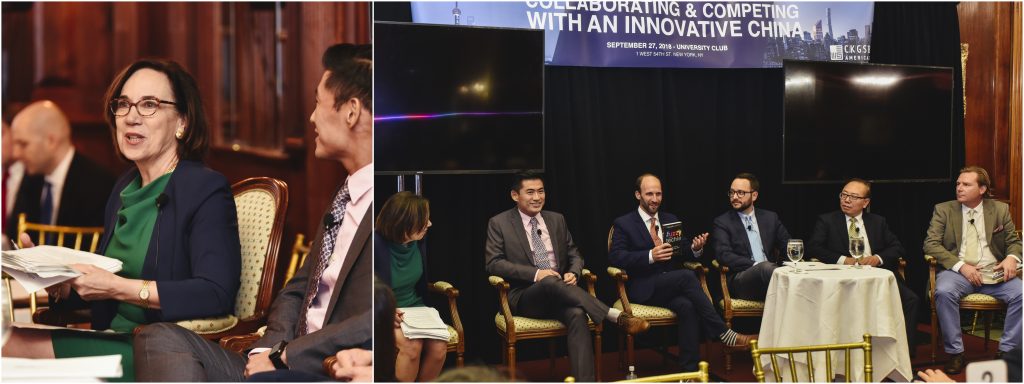
Kathleen Hays, Global Economics and Policy Editor of Bloomberg, hosts the panel and elaborates on issues including US and China investment.
The event’s second panel, moderated by Kathleen Hays, Global Economics and Policy Editor of Bloomberg, and final panel featured several top thought leaders on U.S.-Chinese economic relations, including Nick Consonery of the Rhodium Group; Venture Capitalist and Author Scott Harley; Andrew Romans, a General Partner at Rubicon Venture Capital; Yong Li, Partner at IW Ventures and Director of the Omaha Value Investment Research and Education Center; and Jon Chu, COO at Jetson.
One topic on the minds of all panelists was intellectual property protection, both because it is one of the focal points of current U.S.-Chinese trade disputes, but also because a strong international intellectual property regime is essential for promoting innovation. Romans agreed that IP protection is of primary importance to the companies he invests in, and said that there have been times when companies have declined to file patents, because publishing detailed descriptions of new technology through the U.S. patent system can make it easier for foreign copycats to reproduce those inventions. Li concurred with these concerns, arguing that because China has a less developed rule of law and IP-protection framework, American entrepreneurs must develop deep relationships with Chinese partners that can help them navigate a less rules-based system. “We only work with partners whom we’ve known for many years on a deep level, not just on the surface level,” said LI.
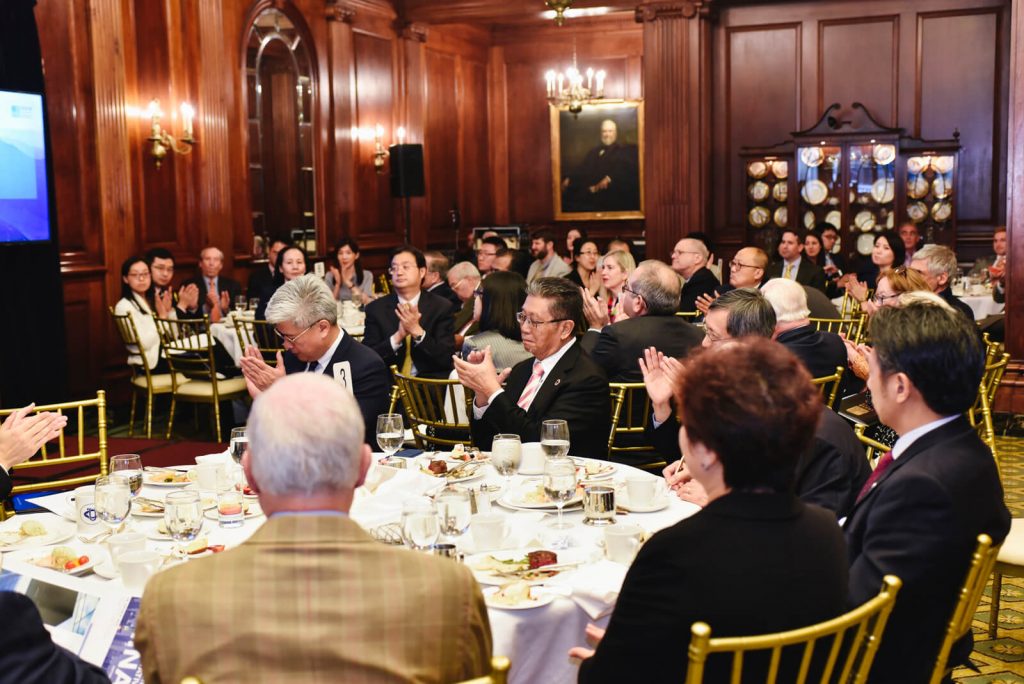
But even if foreign actors in China learn to thrive in its unique copyright regime, they will still have to deal with the effect of tariffs enacted to combat what the U.S. describes as forced technological transfer. Consonery, who has spent more than a decade analyzing the Chinese economy for public and private sector clients, warned that the new tariffs and regulations enacted by the Chinese and American governments has already begun to dampen cross-border economic activity, with potentially lasting effects. Particularly troubling for Consonery is data showing that Chinese direct investment in the U.S. has fallen to a 7-year low in the first half of 2018, while overall investment in May show an annual decline for the first time in decades.
Other panelists, like Scott Hartley were more optimistic. He posited that while new tariffs might be a nuisance in the short term, new impact of new technologies like artificial intelligence will be far more important in the long term. Against this backdrop, Hartley argued, Chinese policymakers are doing a much better job at positioning their economy than their American counterparts. Hartley said that while U.S. leaders worry about protecting the industries of today, “China is focused on commandeering lithium, cobalt and things that are going to lead to autonomous vehicles and battery production.” Andrew Romans agreed that the long-term trajectory of both economies will be driven by forces greater than trade policy. He argued the fundamental importance of the American and Chinese economies to entrepreneurs around the globe will force further economic integration between the two countries, even if their respective governments resist it. “From where I live in Silicon Valley, half of the neighbors on my street are Chinese,” he said. “Every large company needs to be in China to succeed.”
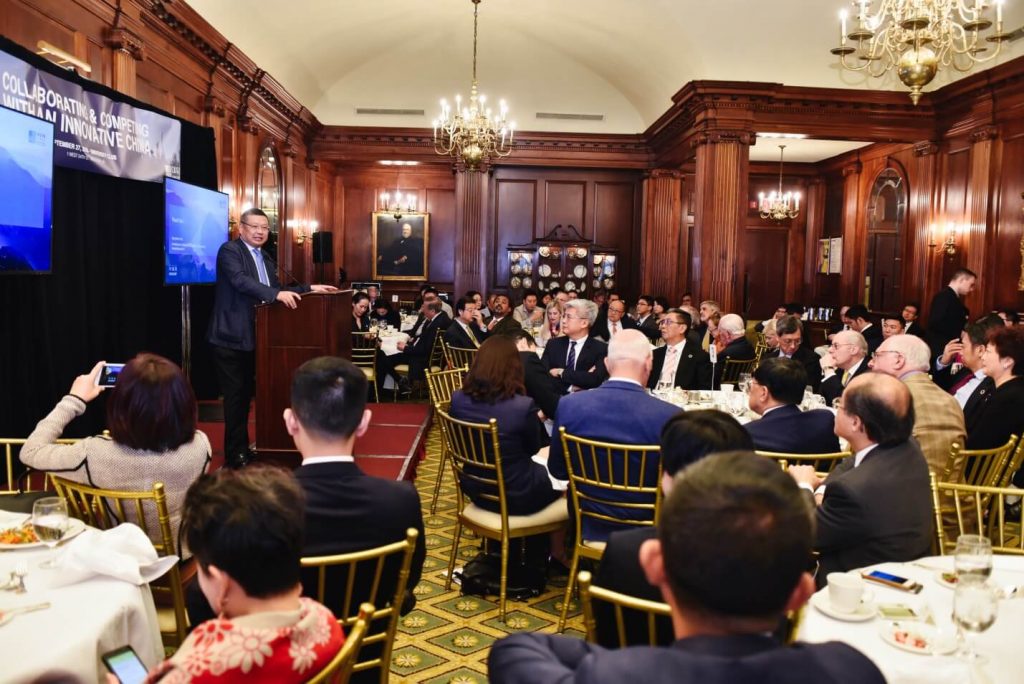
Dean Xiang and guests at the “Collaborating and Competing with an Innovative China” forum